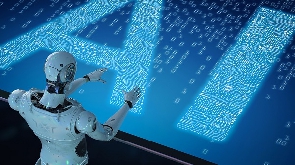Opinions of Sunday, 5 November 2023
Columnist: Dr. Wilson O. Otchie, PhD
Artificial Intelligence: A complex equation of good and bad
Artificial Intelligence (AI) has become a hot topic in recent years, with its potential impact on various aspects of our lives garnering both excitement and concern. In order to better understand AI and its implications, it is important to delve into the concept of AI and how it has evolved over time.
The concept of AI
At its core, AI refers to the development of computer systems that can perform tasks that typically require human intelligence. This includes problem-solving, pattern recognition, and decision-making. The ultimate goal is to create machines that can mimic human cognitive abilities.
So, AI has come a long way since its inception. In the early days, AI was primarily focused on rule-based systems that followed predetermined sets of instructions. However, with advancements in technology and the availability of vast amounts of data, AI has evolved into more complex systems, such as machine learning and deep learning algorithms.
Machine learning algorithms allow computers to learn from data and improve their performance over time without explicit programming. Deep learning, on the other hand, is a subset of machine learning that mimics the neural networks of the human brain, enabling computers to analyze and interpret complex patterns.
The good side of AI
Artificial Intelligence (AI) has emerged as a powerful tool that brings numerous benefits to various industries. Its ability to enhance efficiency and productivity has revolutionized the way tasks are performed. By automating repetitive tasks, AI-powered systems free up human resources to focus on more complex and creative endeavors, leading to increased productivity and improved overall performance.
That said, AI has proven to be a game-changer when it comes to efficiency and productivity. In industries such as manufacturing, AI-powered robots can work tirelessly and with precision, significantly reducing production time and costs. These robots can perform tasks that are too dangerous or monotonous for humans, ensuring a safer work environment while maximizing output.
In the field of customer service, AI-powered chatbots have become increasingly popular. These virtual assistants can handle a large volume of customer inquiries simultaneously, providing quick and accurate responses. This not only improves customer satisfaction but also allows human customer service representatives to focus on more complex issues that require a personal touch.
AI has the potential to revolutionize patient care in the healthcare industry. With its ability to analyze vast amounts of medical data, AI algorithms can identify patterns and detect diseases at an early stage. This early detection can lead to timely interventions and improved patient outcomes. Moreover, AI-powered robots can assist in surgeries, reducing the risk of human error and improving surgical precision. These robots can perform complex procedures with unmatched accuracy, enhancing patient safety and recovery.
Furthermore, AI can play a crucial role in drug discovery and development. By analyzing large datasets and identifying potential drug candidates, AI algorithms can accelerate the process of finding new treatments for various diseases. This not only saves time and resources but also brings hope to patients who are in desperate need of effective therapies.
The impact of AI in education is profound. Intelligent tutoring systems, powered by AI, can provide personalized learning experiences for students. These systems adapt to individual students' needs and pace, ensuring that each student receives tailored instruction. By analyzing student performance and providing targeted feedback, AI-powered tutoring systems can help students overcome learning challenges and achieve their full potential.
AI-powered chatbots are also transforming the way students interact with educational resources. These chatbots can answer students' queries in real-time, providing instant assistance and guidance. Additionally, they can recommend relevant study materials and resources, making education more accessible and engaging for students of all backgrounds.
Moreover, AI can assist educators in administrative tasks such as grading and assessment. By automating these processes, AI frees up valuable time for teachers to focus on instructional planning and individual student support. This not only improves the efficiency of educational institutions but also enhances the quality of education.
Undoubtedly, AI brings numerous benefits to various industries, enhancing efficiency, productivity, and innovation. From revolutionizing patient care in healthcare to transforming the way we learn in education; AI has the potential to shape a better future for all. On the other hand, despite all the goodies about AI, there are some concerns and uncertainties.
The bad side of AI
One of the major concerns surrounding AI is the potential displacement of jobs. As AI systems become more advanced, there is a fear that they may replace humans in various industries. This could lead to unemployment and economic inequality if proper measures are not taken to reskill and upskill the workforce.
Imagine a world where AI-powered robots take over the manufacturing industry. These robots are capable of performing tasks with incredible precision and efficiency, leading to increased productivity. However, this also means that human workers who once held those jobs are now left without employment. The impact on individuals and communities can be devastating, as they struggle to find new opportunities in an increasingly automated world.
Furthermore, the displacement of jobs is not limited to the manufacturing sector. AI algorithms are being developed to perform tasks traditionally done by humans, such as customer service, data analysis, and even creative endeavors like writing and painting. While this may lead to improved efficiency and cost-effectiveness for businesses, it also raises concerns about the future of work and the skills that will be in demand.
With AI systems collecting and analyzing vast amounts of data, there are legitimate concerns about privacy. AI algorithms require access to personal information to make intelligent decisions, raising questions about data security and the ethical use of this information. Safeguarding privacy will be crucial as AI continues to advance.
Consider a scenario where AI-powered virtual assistants are integrated into our homes, cars, and personal devices. These assistants are designed to learn from our behaviors and preferences, providing personalized recommendations and assistance. However, this level of personalization comes at a cost - the constant monitoring and analysis of our activities and conversations.
While AI systems are designed to respect privacy and protect sensitive information, there is always a risk of data breaches or unauthorized access. The more we rely on AI to handle our personal data, the more vulnerable we become to potential privacy violations. Striking a balance between the benefits of AI and the protection of privacy will be an ongoing challenge.
Another potential downside of AI is the increasing dependence on technology. As AI systems become more prevalent in our daily lives, there is a risk of overreliance and a decline in critical thinking and problem-solving skills. Striking a balance between the benefits of AI and maintaining human autonomy will be essential.
Imagine a world where AI-powered decision-making systems are responsible for managing complex tasks in various sectors, such as healthcare, finance, and transportation. While these systems can analyze vast amounts of data and make predictions with high accuracy, they lack the human ability to think critically and consider the broader context.
Over time, humans may become overly reliant on AI systems, trusting them blindly without questioning their recommendations or decisions. This overdependence can lead to a decline in critical thinking skills, as individuals rely on AI to provide solutions instead of engaging in independent problem-solving. Striking a balance between leveraging the capabilities of AI and nurturing human cognitive abilities will be crucial for the future.
The Uncertainties
Artificial Intelligence (AI) is a rapidly evolving field that holds immense potential for transforming various aspects of our lives. It has the power to revolutionize industries, improve efficiency, and enhance decision-making processes. However, with great power comes great responsibility, and AI raises several ethical dilemmas that require careful consideration.
One of the most pressing ethical dilemmas surrounding AI is the question of how autonomous vehicles should prioritize safety in potential accidents. Should they prioritize the safety of the occupants or minimize harm to pedestrians? This dilemma forces us to grapple with the value of human life and the complex decisions AI systems may have to make in split seconds. Addressing these ethical questions will be crucial in shaping the future of AI and ensuring that it aligns with our values and priorities.
Another ethical concern is the potential for AI algorithms to perpetuate biases present in the datasets they are trained on. If these datasets contain biases, such as racial or gender biases, AI systems may inadvertently make decisions that discriminate against certain groups. Efforts to mitigate and eliminate bias in AI systems are essential to ensure fairness and equality in the outcomes they produce.
While AI holds immense promise, its future is still uncertain. As technology continues to advance at an unprecedented pace, new challenges and opportunities will arise. The rapid development of AI raises questions about the potential impact on the job market, privacy concerns, and the overall societal implications. It will be important for policymakers, researchers, and society as a whole to navigate the complexities of AI and shape its development for the greater good.
Furthermore, the integration of AI into various industries and sectors will require careful planning and consideration. The potential benefits of AI are vast, but so are the potential risks. Striking the right balance between innovation and regulation will be crucial to ensure that AI is harnessed responsibly and ethically.
Moreover, the future of AI also holds exciting possibilities. AI has the potential to revolutionize healthcare by enabling more accurate diagnoses and personalized treatment plans.
It can enhance education by providing personalized learning experiences tailored to individual students. AI-powered virtual assistants can simplify our daily lives by automating mundane tasks and providing valuable insights. The possibilities are endless, and as AI continues to evolve, it will be fascinating to witness its impact on various fields.
In conclusion, AI has the potential to bring about significant advancements in various fields. By understanding the concept of AI, its evolution, and the different sides of its impact, we can better prepare for the future. It is crucial to harness the benefits of AI while addressing the concerns and ethical considerations to ensure a responsible and beneficial integration of AI in our lives.













